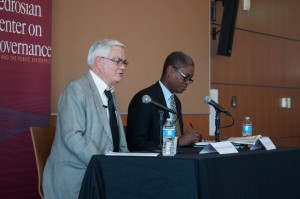Experts, panelists discuss the impact of local politics
Former Riverside, Calif. Mayor and long-time public policy figure Ronald Loveridge joined Raphael Bostic of the Bedrosian Center on Governance on Wednesday afternoon for a discussion on local government and sustainability in the Ronald Tutor Campus Center Forum.

Politicized · Former Riverside Mayor Ronald Loveridge (left) and the Bedrosian Center on Governance director Raphael Bostic talk Tuesday. — Priyanka Patel | Daily Trojan
The Jesse M. Unruh Institute of Politics, Sol Price’s Tomás Rivera Policy Institute and Sol Price’s Bedrosian Center on Governance and Public Enterprise hosted the weekly Student Talk Back series. This week’s was focused on Los Angeles municipal politics in light of the upcoming Los Angeles mayoral race.
Loveridge, who entered politics in 1979 when he was elected to serve on Riverside’s city council, currently teaches in the political science department at UC Riverside. He spoke to students on the importance of city governance, particularly the significance cities had and the immediacy of policy changes at the local level.
“As mayor of a city, you see the consequences of everything you do,” Loveridge said. “You see the potholes that don’t get filled. You meet people who are directly affected by every action you take. That isn’t necessarily true for leaders in Washington and Sacramento.”
Much of the discussion was dedicated to Loveridge’s own experience running for public office and serving the mayor of Riverside from 1994 to 2012. He recalled approaching a political consultant soon after making the decision to run and being told to come back when he’d developed an agenda of what he wanted to accomplish.
“As mayor, you can advocate in ways that you can’t as a city council member,” Loveridge said. “I ran on the platform of safe streets, good jobs and great neighborhoods for the city. I distributed a pamphlet called ‘Renewing Riverside’, with my plan clearly mapped out so that people could hold me accountable.”
Riverside, which doubled in population from 150,000 to 300,000 during Loveridge’s 18 years as mayor, has been recognized on national and international levels for its development and programs. The wide-reaching recognition is fitting considering Loveridge’s past efforts to gain inspiration from other municipalities.
“I traveled to other cities and made it my goal to bring back three to five new ideas from every place I went,” Loveridge said.
Sustainability became of tremendous importance for Riverside as the city grew. Loveridge spearheaded issues of environmental protection, health, clean air and clean water.
“We regard ourselves as a green city,” Loveridge said. “I’m not sure that it’s a left or right cause. I think it’s about how people see their city and the aspirations they have for it. Sustainability can have tremendous consequences and opportunities for citizens.”
Loveridge made a point of defining local government as “friends-and-neighbors politics.” He stressed the importance of meeting directly with constituents.
“The next mayor of Los Angeles will have a huge responsibility. L.A. is one of the capitals of the world, and the person who leads it can have a tremendous impact not only on the city, but on all of Southern California,” Loveridge said.
Loveridge’s talk provided students with the type of practical background that frequently goes unmentioned in textbooks.
“Oftentimes in school you read a lot of academic, theoretical articles about running a city, but it’s really great when you see a mayor who can talk about the implementation process of real-life policies from the ground perspective,” said Yolanda De La Paz, a first-year graduate student in USC’s master of public policy program. “I think he really brought it home with the reminder that all politics is local and when you connect with people on that regional level, you can really make things happen.”
The mayoral primary election takes place March 5. The municipal election is on May 21.

Excellent article Austin, we’re hopeful that students enjoy the change to learn from experts in the field. The Bedrosian Center (http://bedrosian.usc.edu/), along with the Unruh Institue and the Tomas Rivera Policy Institute will be continuing this series for the rest of the semester. We’d love to hear feedback from students. Tell us what you liked and what you’d like to see in the future.